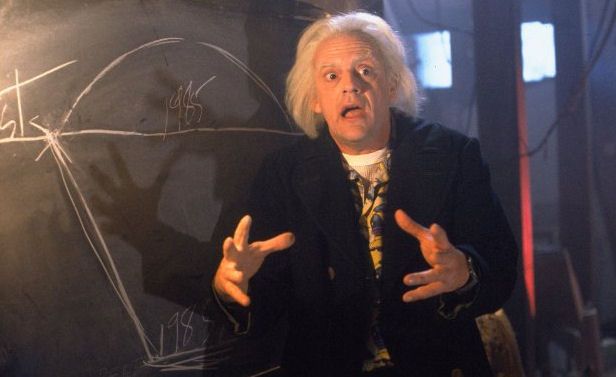Manic March #13: Fix Your Hearts or Die
March 13, 2022
Manic March - Fix Your Hearts or Die
We often portray time as a straight line, with choices diverging off of it as if there is one main tree with numerous smaller branches; however, this design choice seems to suggest that our lives flow like the Mississippi River, with various distributaries such as the Atchafalaya – i.e., that there is one main path of the status quo, and these distributaries represent conscious choices. This status quo-oriented thinking is a mistake; to remain in the status quo also requires a choice.

In Back to the Future, the characters (rightfully) attempt to preserve the old status quo
In this, the status quo is often the easiest option; this choice is to defend things the way they currently are and preserve them, with all their faults and flaws, saying a different world is less preferable to this one. We can attribute much inertia to the fact that some believe that we exist in the best world possible, from healthcare to urban design. This position is no better than just giving up; to default to the status quo is to remove choices from one’s life, to wake up in thirty, forty, fifty years and ask where all the time went, and why isn’t your life as you dreamed it. Rarely does a river drift where people want it to go. To move from the status quo requires a branch, some use of optionality not normally exercised, be it clearing a log jam or getting into a DeLorean. I (partially) disagree with this framing.
Both the status quo and the alternate option ought to be framed as choices; we cannot allow ourselves to drift through our lives aimlessly, viewing branches as choices we could exercise if only we had a little more motivation. Rather, remaining in the water is as much a choice which requires effort. By viewing one as more difficult than the other, we take agency from ourselves and give it to time to make our decisions for us. Sometimes, the status quo is better! But we ought to consider the status quo just as thoroughly as its alternatives, as if we were not in this situation and presented with the status quo along with a set of alternatives. Following decisional inertia blindly may result in wondering where all the time went; at the same time, not all changes are for the positive. We must navigate between these two as Scylla and Charybdis.
“Fix your hearts or die” serves as a reminder for us not to blindly accept the status quo. In Exodus, Pharaoh hardened his heart, accepting the status quo, keeping the Israelites in bondage. Those who worked on the Manhattan Project refused to fix their hearts, instead opting to birth a bomb that could wipe out life on the planet. And today, many harden their hearts at the signs of suffering in the world, choosing to accept the day-to-day suffering we see. But, we all have an obligation to fix our hearts, to consider all the paths to see where our hearts lead. We all may die, but to give up your ability to make choices kills you before you die; both a corpse and one who blindly follows the status quo cannot make choices. Thus, fix your hearts or die.
What is Manic March?
On February 27, 2022, I thought it would be a great idea to create some sort of content - writing, art, coding, etc. - every day of the next month. Luckily, the alliteration worked out. This should be the thirteenth (lucky number!) post in the series.